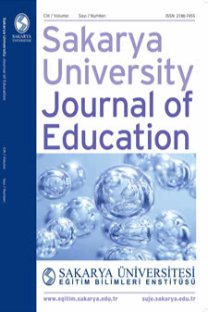Foreign Language Teaching Anxiety among Non-native Teachers of English: A Sample from Turkey
İngilizceyi Yabancı Dil olarak Öğreten Öğretmenlerin Yabancı Dil Öğretimi Kaygısı: Türkiye'den Bir Örneklem
___
- Aslrasouli, M., & Vahid, M. S. P. (2014). An investigation of teaching anxiety among novice and experienced Iranian EFL teachers across gender. Procedia Social and Behavioral Sciences, 98, 304- 313.
- Ay, S. (2010). Young adolescent students' foreign language anxiety in relation to language skills at different levels. The Journal of International Social Research, 3(11), 83-92.
- Aydın, B. (2001). A study of sources of foreign language classroom anxiety in speaking and writing classes. Eskişehir: Anadolu University Publications.
- Aydın, S. (2016). A qualitative research on foreign language teaching anxiety. The Qualitative Report, 21(4), 629-642.
- Balemir, S. H. (2009). The sources of foreign language speaking anxiety and the relationship between proficiency level and the degree of foreign language speaking anxiety (Unpublished Master's Thesis). Bilkent University, Turkey.
- Bekleyen, N. (2004). Foreign language anxiety. Çukurova Üniversitesi Sosyal Bilimler Enstitüsü Dergisi, 13(2), 27-39.
- Canessa, L. (2004). A study of non-native foreign language teachers and their feelings of foreign language teaching anxiety (Unpublished Master's Thesis). The University of Texas, Austin.
- Cheng, Y. S. (2002). Factors associated with foreign language writing anxiety. Foreign Language Annals, 35(6), 647-656.
- Creswell, J. W. (2012). Educational research: Planning, conducting, and evaluating quantitative and qualitative research (4th ed.). Boston: Pearson Education.
- Dörnyei, Z. (2007). Research methods in applied linguistics. New York: Oxford University Press.
- Elkhafaifi, H. (2005). Listening comprehension and anxiety in the Arabic language classroom. Modern Language Journal, 89(2), 206-220.
- Horwitz, E. K., Horwitz, M. B., & Cope, J. (1986). Foreign language classroom anxiety. The Modern Language Journal, 70(2), 125-132.
- Horwitz, E. K. (1996). Even teacher get the blues: Recognizing and alleviating non- native teachers" feelings of foreign language anxiety. Foreign Language Annals, 29(3), 365-372.
- İpek, H. (2006). Foreign language teaching anxiety (Unpublished PhD Dissertation). Anadolu University, Turkey.
- Kim, S. Y., & Kim, J. H. (2004). When the learner becomes a teacher: Foreign language teaching anxiety as an occupational hazard. English Teaching, 56(1), 165-186.
- Klanrit, P., & Sroinam, R. (2012). EFL teacher's anxiety in using English in teaching in the language classroom. International Journal of Social Science and Humanity, 2(6), 493-496.
- Koch, A. S., & Terrell T. D. (1991). Affective reactions of foreign language students to natural approach activities and teaching procedures. In E. K. Horwitz & D. J. Young (Eds.), Language anxiety (pp. 109-125). London: Prentice Hall International Limited.
- Kongchan. C., & Singhasiri, W. (2008). Teachers' anxiety about using L2 in EFL classrooms. Proceedings of the 16th Annual Korea TESOL International Conference : Responding to a Changing World. Seoul, Korea. 25 - 26 Oct. 2008. pp. 145- 149.
- Liu, M., & Jackson, J. (2008). An exploration of Chinese EFL learners' unwillingness to communicate and foreign language anxiety. Modern Language Journal, 92(1), 71-86.
- Merç, A. (2011). Sources of foreign language student teacher anxiety: A qualitative inquiry. Turkish Online Journal of Qualitative Inquiry, 2(4), 80-94.
- Mosaddaq, D., & Barahmeh, Y. (2016). A study of sources of EFL student teachers' anxiety during their practicum experience. European Journal of Research and Reflection in Educational Studies, 4(1), 16-25.
- Numrich, C. (1996). On becoming a language teacher: Insights from diary studies. TESOL Quarterly, 30(1), 131-151.
- Öztürk, G. (2012). Foreign language speaking anxiety and learner motivation: A case study at a Turkish state university (Unpublished master's thesis). Middle East Technical University, Turkey.
- Öztürk, G., & Gürbüz, N. (2013). The impact of gender on foreign language speaking anxiety and motivation. Procedia-Social and Behavioral Sciences, 70, 654-665.
- Philips, E. M. (1991). Anxiety and oral competence: Classroom dilemma. French Review, 65, 1-13.
- Saito, Y., & Samimi, K. K. (1996). Foreign language anxiety and language performance: A study of learner anxiety in beginning, intermediate and advanced-level college students of Japanese. Foreign Language Annals, 29(2), 239-248.
- Saito, Y., Horwitz. E. K., & Garza, T. J. (1999). Foreign language reading anxiety. The Modern Language Journal, 83(2), 202-218.
- Saltan, F. (2003). EFL speaking anxiety: How do students and teachers perceive it? (Unpublished Master's Thesis). Middle East Technical University, Turkey.
- Stempel, G. H. (1989). Content analysis. In G. H. Stempel & B. H. Westley (Eds). Research methods in mass communications, Englewood Cliffs NJ: Prentice-Hall
- Tanveer, M. (2007). Investigations of the factors that cause language anxiety for ESL/EFL learners in learning speaking skills and the influence it casts on communication in the target language (Unpublished Master's Thesis). University of Glasgow, Scotland.
- Tseng, C. (2005). Taiwanese English teachers' language anxiety: A comparison study between elementary school and high school teachers (Unpublished Master's Thesis). The University of Texas, Austin
- Tum, D. O. (2010). A study of non-native teachers' and student teachers' feelings of foreign language teaching anxiety (Unpublished Master's Thesis). The University of Texas, Austin.
- Tum, D. O. (2012). Feelings of language anxiety amongst non-native student teachers. Procedia Social and Behavioral Sciences, 47, 2055-2059.
- Williams, L. S. (1991). The effects of a comprehensive teaching assistant training program on teaching anxiety and effectiveness. Research in Higher Education, 32(5), 585-598.
- Young, D. J. (1990). An investigation of students' perspectives on anxiety and speaking. Foreign Language Annals, 23(6), 539-553.
- ISSN: 2146-7455
- Yayın Aralığı: 3
- Başlangıç: 2011
- Yayıncı: Sakarya Üniversitesi Eğitim Bilimleri Enstitüsü
Foreign Language Teaching Anxiety among Non-native Teachers of English: A Sample from Turkey
Pelin PİŞTAV AKMEŞE, Nilay KAYHAN
Sanal Zorbalıkla Baş Etme Ölçeği: Geçerlilik ve Güvenirlik Çalışması
Mustafa KOÇ, Mehmet Barış HORZUM, Tuncay AYAS, Furkan AYDIN, Ahmet ÖZBAY, Erol UĞUR, Senem ÇOLAK
Örgütsel Hafıza Ölçeği’nin Türkçe’ye Uyarlanması: Geçerlik ve Güvenirlik Çalışması
Tuğba Seda ÇOLAK, Murat İSKENDER, Mustafa KOÇ, Betül DÜŞÜNCELİ
